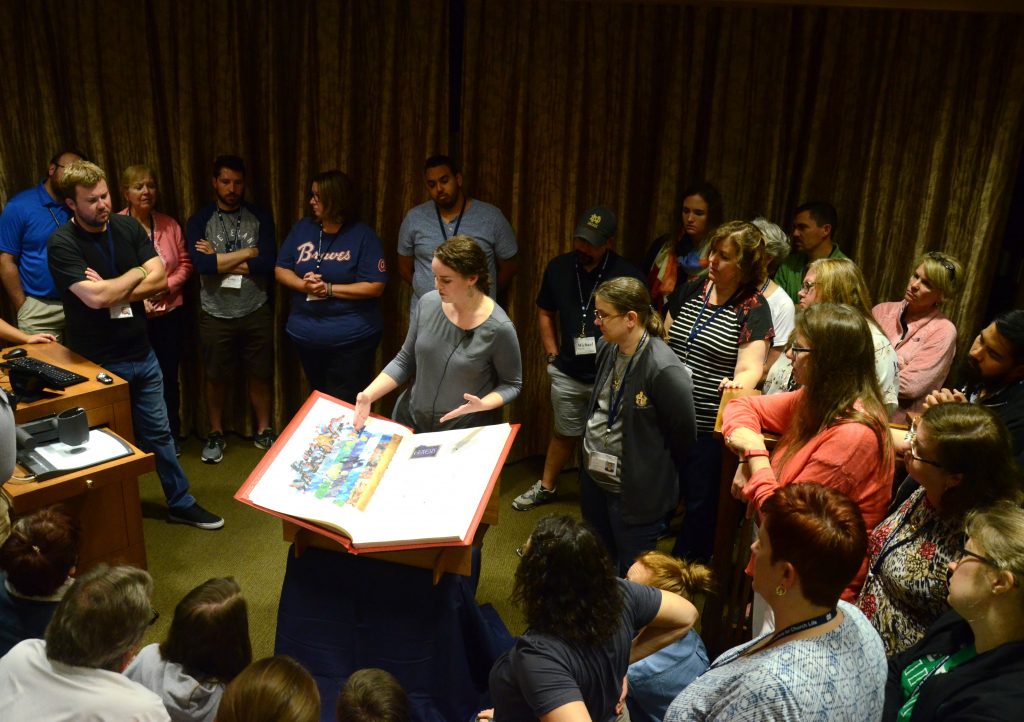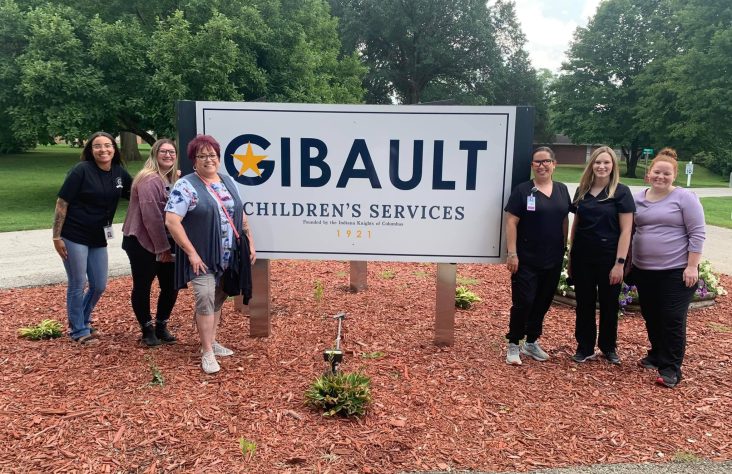September 6, 2019 // Schools
Breaking down the walls between science, education
During June and early July, teachers from Marian High School, Mishawaka, and Saint Joseph High School, South Bend, worked with Catholic scientists, philosophers and theologians to meet a crucial need: the integration of faith and science in their classrooms and throughout the high school curriculum. They and other educators were welcomed to the Science & Religion Initiative of the McGrath Institute for Church Life of the University of Notre Dame for weeklong seminars aimed at this goal at the Notre Dame campus.

Carolyn Pirtle of the McGrath Institute for Church Life describes the depiction of the seven days of creation in the St. John’s Bible to high school teachers at the SRI Capstone Seminar at the University of Notre Dame in July. — William Schmitt
Since 2014, Catholic educators have joined with peers from Catholic schools across the country for the sake of building “a synthesis of faith and culture, reached by integrating all of human knowledge through the subjects taught, in the light of the Gospel,” as called for by the Vatican Congregation for Catholic Education. Since then, more than 400 high school teachers nationwide have participated in the Foundations and Capstone seminars in an effort to create a new approach to professional development and classroom implementation.
SRI gives teachers official Church resources and insights to draw upon for big-picture discussions and lesson plans that break down the walls often isolating religion education from science education. The initiative equips educators to convey the complementarity of faith and reason, science and religion. The approach received international recognition in 2018 with an Expanded Reason Award bestowed by the Vatican Foundation and the University of Francisco de Vitoria.
Selected participants probe ways to help students “see scientific investigation and discoveries in the light of the Catholic faith,” said Chris Baglow, director of SRI. “To be able to connect [scientific learning] to their faith is a way of helping young people to see the glorious harmony between the Book of Nature and the Book of Scripture, which both reveal the Creator.”
Addressing the teachers at one of this summer’s seminars, Baglow suggested “bringing home to your students that, without a holistic view of the world, they’ll find it very hard to understand themselves and find it very hard to know how to act and find meaning in that world.”
They need to see how “Christianity is offering answers” in a world where divine principles endure but “there are always new horizons” for any field of knowledge to explore, Baglow said. Theology is defined as “faith seeking understanding”; that is, “it’s an activity” in which students can feel engaged.
Sister Marie Morgan and Mary Ann Hinora represented Marian at this year’s Foundations seminar, while Chris Culver, Deb Semmler, and Mary Kate Lamp represented Saint Joseph at the advanced Capstone Seminar.
One teacher responded to the seminar by commenting that students “shouldn’t think it means they’re less Catholic” if they have questions that go beyond their catechetical learning. In embracing questions, “they come to understand God better.”
Another teacher said the seminar had answered many of her own questions, but she was also grateful that the week’s talks and workshops had “given me far more questions to actively seek answers to.” Those sessions, she said, reinforced the guidance, “read more about this, look this up,” using the authoritative resources that could help her reach students.
SRI is now accepting high schools’ applications for the 2020 Foundations Seminar in its two locations. Applications are due by Dec.3. Educational leaders can apply or learn more about these programs, the Capstone Seminar and Institute Days by visiting the SRI website, mcgrath.nd.edu/science.
The best news. Delivered to your inbox.
Subscribe to our mailing list today.






